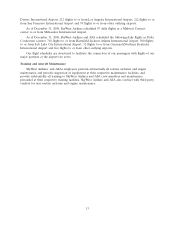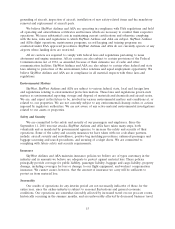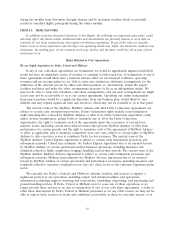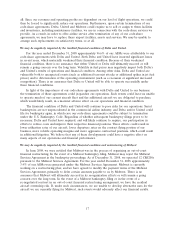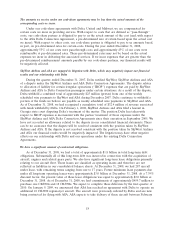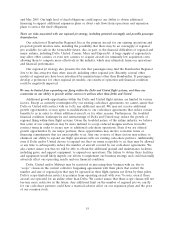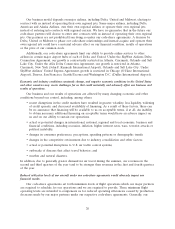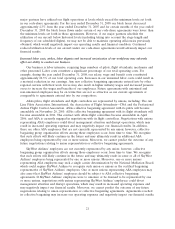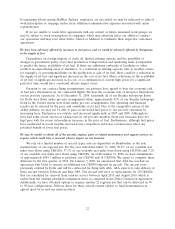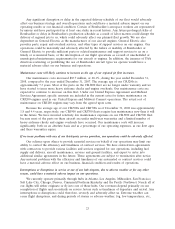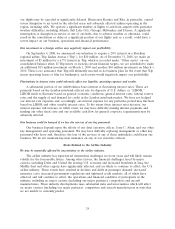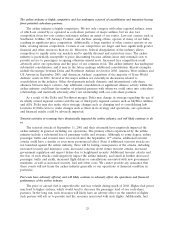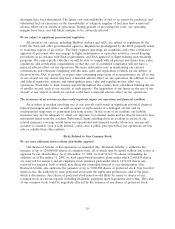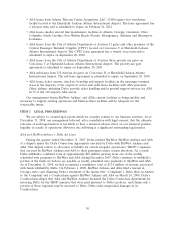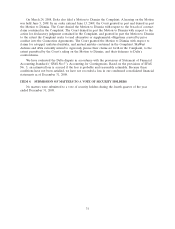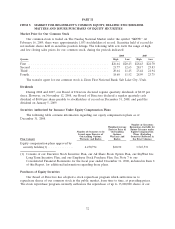SkyWest Airlines 2008 Annual Report Download - page 27
Download and view the complete annual report
Please find page 27 of the 2008 SkyWest Airlines annual report below. You can navigate through the pages in the report by either clicking on the pages listed below, or by using the keyword search tool below to find specific information within the annual report.Any significant disruption or delay in the expected delivery schedule of our fleet would adversely
affect our business strategy and overall operations and could have a material adverse impact on our
operating results or our financial condition. Certain of Bombardier’s aerospace workers are represented
by unions and have participated in at least one strike in recent history. Any future prolonged strike at
Bombardier or delay in Bombardier’s production schedule as a result of labor matters could disrupt the
delivery of regional jets to us, which could adversely affect our planned fleet growth. We are also
dependent on General Electric as the manufacturer of our aircraft engines. General Electric also
provides parts, repair and overhaul services, and other types of support services on our engines. Our
operations could be materially and adversely affected by the failure or inability of Bombardier or
General Electric to provide sufficient parts or related maintenance and support services to us on a
timely or economical basis, or the interruption of our flight operations as a result of unscheduled or
unanticipated maintenance requirements for our aircraft or engines. In addition, the issuance of FAA
directives restricting or prohibiting the use of Bombardier aircraft types we operate would have a
material adverse effect on our business and operations.
Maintenance costs will likely continue to increase as the age of our regional jet fleet increases.
Our maintenance costs increased $83.7 million, or 28.1%, during the year ended December 31,
2008, compared to the year ended December 31, 2007. The average age of our CRJ200s is
approximately 7.3 years. Most of the parts on the CRJ200 fleet are no longer under warranty and we
have started to incur more heavy airframe checks and engine overhauls. Our maintenance costs are
expected to continue to increase on this fleet. Under our United Express Agreement and Midwest
Services Agreement, specific amounts are included in the current rates for future maintenance on
CRJ200 engines used in our United Express and Midwest Connect operations. The actual cost of
maintenance on CRJ200 engines may vary from the agreed upon rates.
Because the average age of our CRJ900s and CRJ700s as of December 31, 2008 was approximately
1.8 and 4.4 years, respectively, our CRJ900 and CRJ700 fleets require less maintenance now than it will
in the future. We have incurred relatively low maintenance expenses on our CRJ900 and CRJ700 fleet
because most of the parts on these aircraft are under multi-year warranties and a limited number of
heavy airframe checks and engine overhauls have occurred. Our maintenance costs will increase
significantly, both on an absolute basis and as a percentage of our operating expenses, as our fleet ages
and these warranties expire.
If we incur problems with any of our third-party service providers, our operations could be adversely affected.
Our reliance upon others to provide essential services on behalf of our operations may limit our
ability to control the efficiency and timeliness of contract services. We have entered into agreements
with contractors to provide various facilities and services required for our operations, including fuel
supply and delivery, aircraft maintenance, services and ground facilities, and expect to enter into
additional similar agreements in the future. These agreements are subject to termination after notice.
Any material problems with the efficiency and timeliness of our automated or contract services could
have a material adverse effect on our business, financial condition and results of operations.
Interruptions or disruptions in service at one of our hub airports, due to adverse weather or for any other
reason, could have a material adverse impact on our operations.
We currently operate primarily through hubs in Atlanta, Los Angeles, Milwaukee, San Francisco,
Salt Lake City, Chicago, Denver, Cincinnati/Northern Kentucky and the Pacific Northwest. Nearly all of
our flights will either originate or fly into one of these hubs. Our revenues depend primarily on our
completion of flights and secondarily on service factors such as timeliness of departure and arrival. Any
interruptions or disruptions could, therefore, severely and adversely affect us. Extreme weather can
cause flight disruptions, and during periods of storms or adverse weather, fog, low temperatures, etc.,
23


